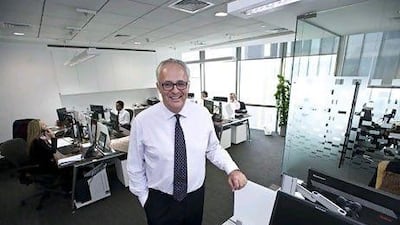Mark Malloch Brown has a fair claim to have predicted the Arab Spring.
In 2002, when he was in charge of the United Nations Development Programme, he was responsible for publishing the Arab Human Development Report, which revealed a high level of dissatisfaction among many citizens in the Middle East with regard to education, democracy, jobs, freedom of speech and the role of women - exactly the issues that last year prompted the outburst of regime-changing protests.
"I suppose you could say it was prophetic. It was condemned in the Arab League and by many governments in the Arab world, but it was downloaded 1 million times from the UN website. I was staggered; UN reports don't usually become publishing sensations. So I wasn't surprised when [the Arab Spring] happened last year. I was more surprised it took so long to happen," he says.
The 58-year-old British lord (he is formally Baron Malloch-Brown of St Leonard's Forest in the County of West Sussex) was in the UAE recently as part of his current job as the international head of a big consultancy group listed in the United States, but also to get a feel for the political temperature in the region after the recent upheavals.
His views on big global issues are worth listening to. His CV lists senior jobs at the World Bank and the UN (where he was for a time deputy to the secretary general Kofi Annan) as well as a stint as a member of the British government in the Foreign Office under prime minister Gordon Brown.
He has travelled to and worked in many of the world's conflict zones, and has serious views on the state of international affairs today. His book published last year, The Unfinished Global Revolution, argues the case for stronger international institutions to prevent conflicts.
"We're being dragged into a globalised world back feet first," he says. "Economics, business, communications and travel all mean we live in a global neighbourhood, but the politics hasn't caught up yet. It can go one of two ways. Either global institutions like the UN and G20 [Group of 20 leading and emerging economies] play a greater role with more authority, or we go global in the 20th-century way, with conflicts and world wars."
That's a pretty stark choice, and he says the short-term prospects are not encouraging. "There are creeping conflicts in many parts of the world. When some people were predicting the end of history and conflict in 1989 when communism fell, it turned out that a whole series of conflicts - in the Balkans and in Central Africa, for example - had merely been suppressed and contained.
"The Arab world was a classic case of this. We are now witnessing radical change in the region, and if experience is anything to go by, for example in Eastern Europe in the 1990s, you're looking at 10 years before something clear emerges. Even that is the time frame of a pragmatic optimist. There could be many slips and spills along the way," he says.
He urges caution by those who advocate a western-style democratic outcome to the upheavals of the Arab Spring. "There will be times when that wish will be hard to keep hold of, and many slips could occur along the way. But whatever emerges should respect minorities and be inclusive. It would be a tragedy if sectarian differences between Sunnis and Shias were allowed to spill over," he says.
He takes heart from what he perceives as an increasing willingness by the Bric countries - Brazil, Russia, India and China - to get involved in solving international problems, even if, in the case of China especially, "we don't always agree with its position on some big issues". He believes China is much more of a "global stakeholder" than it was even 10 years ago.
But he also believes it would be wrong to write off the US, which was the driving force behind the setting up of global institutions such as the UN, World Bank and IMF. "Whoever wins the White House later this year will find the fiscal precipice and budget deficits are still there, but I think if those are solved the USA is in for a renaissance. It has the potential to be energy self-sufficient and more competitive in manufacturing again," he says.
Where does the Gulf fit into this world view? "The Gulf states have the opportunities and challenges of city states in the ages of great empires. There is huge commercial potential for them, but always with a risk. The Gulf has given lots of people from round the world stability and prosperity and the governments won't want to risk that. If there is to be democracy, it has to come from inside the states."
But as ever, the business of the Gulf is business, and as the chairman of Europe, Middle East and Africa for FTI Consulting, one of the top 10 American consultancies, he has responsibility for the strategic communications, investigations, corporate restructuring and arbitration activities of the firm in the region. "We are planning to come on strong here," he says.
twitter: Follow and share our breaking business news. Follow us
iPad users can follow our twitterfeed via Flipboard - just search for Ind_Insights on the app.

